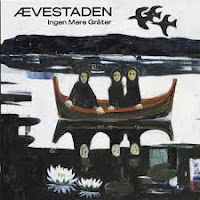I seem to have neglected my blog since the spring and now
it’s nearly the end of the year. It’s not because I’ve had nothing to report. On the
contrary, I’ve been busy taking in lots of good music, doing lots of writing
and travelling quite a bit - but the poor old blog has, like my garden, been left to
lie fallow. Let’s hope the quality of
the soil will have improved in the interim and the yield will be increased in
the coming year.
 |
| My latest album, released in June 2023 |
One of the things that distracted me from blogging was working
on – and then releasing – my new album
In the Emptiness. Through April
and May I was busy checking and approving the masters and artwork ready for the
album’s release in June.
But life has a way of getting in the way of our plans, and
so it was that throughout May, the house demanded attention in the form of some
significant cracks in the ceilings of the living room and the landing. For days
on end my home was taken over by plasterers - and then carpet fitters - so the
concentration needed for writing was hard to find. I did manage to attend a
Writing West Midlands Regional Writers’ Meet-up in Stratford, which only made
me feel more guilty for not devoting more time to writing fiction. Having
said that, over the course of 2023, I’ve been more active on the journalistic
front, and have had twenty pieces published in a variety of magazines including
Songlines and Resurgence so, with hindsight, I can see my writing
energies, rather than lying dormant, have simply been redirected into journalism.
In May I also attended the Dulcimers at Halsway weekend, (an annual event I’ve written about in the past on this blog,) but this was the first
time I’d spent the Halsway week sleeping in my microcamper, which made the
event feel more ‘outdoorsy’ (as well as making the trip more economical.) As always, I learnt a
lot from the visiting mountain dulcimer tutors who, this year, were the
wonderful Erin Mae Lewis from Kansas and Thomasina Levy from Connecticut.
June finally saw the release of my album with a launch gig
at the Swan Theatre’s Culture Café in Worcester as well as a radio ‘appearance’
on Black Country Radio (with their incomparable presenter, Billy Spakemon.)
I also managed to catch some excellent films in June at the recently refurbished
Ludlow Assembly Rooms: Margy Kinmonth’s brilliant documentary about the great landscape artist Eric Ravilious –
Eric Ravilious: Drawn to War – and a highly entertaining new version of
The Three Musketeers: D'Artagnan (directed by Martin Bourboulon,) which literally left me wanting more. (It wasn't until the end credits that I realised this was the first of two linked feature films; Part Two:
The Three Musketeers: Milady, is due for release this month.) The third film I saw in June was, I’m afraid, the new version of
The Little Mermaid at
Kidderminster’s Lume cinema. I’m very fond of the original and felt this was a pale imitation, but it was made more entertaining by my two little grandchildren who sat – but mostly stood – excitedly in the row in front of me!
 |
| One of the best open mic nights in Cumbria |
In July I took off in my microcamper again to revisit
Keswick, one of my favourite places in England. It was my first visit to
Keswick without my late wife Sue, who loved the place as much as I do. It felt
strange and, at times, very emotional to be back in Keswick without her, only
three years after her I lost her. I was pleased to find our favourite café –
the Square Orange – was still there. Visiting Keswick, and especially the Square
Orange, felt like a bit of a pilgrimage to Sue. I stayed at the Camping and
Caravaning Club’s excellent campsite on the shores of Derwentwater. This is
only a short walk into town so I was easily able to carry my guitar to the
Crafty Baa, where I had the great pleasure of playing at the Open Mic night,
run by the irrepressible Darren Farnham.
 |
| Damian Clarke - hurdy-gurdy man - in Worcester |
Later in July, I performed as part of the
Malvern Rocks
Festival and also the
Worcester Fringe Festival (where I finally got to meet Damian
Clarke – hammered dulcimer player, hurdy-gurdyist, busker, artist and author.)
My August was, like the previous year, largely taken up with the Purbeck
Valley Folk Festival followed swiftly by Shrewsbury Folk Festival. In between
these two festivals there was more drama on the domestic front as my washing
machine gave up the ghost and needed replacing.
So, first, Purbeck...
There can’t be many other festivals where, from the
campsite, you can catch a glimpse of a steam train and have a clear view of a
thousand-year-old castle. Nearby Corfe Castle stands sentinel, guarding the
route through the Purbeck Hills that leads to this gem of a musical gathering.
This year’s headline attractions included English
alt-rockers The Magic Numbers, electro-acoustic whizz-kid Newton Faulkner (who
also shared insights in a guitarists’ workshop) and the ever-popular Seth
Lakeman.
Alongside these big names, Purbeck excels at supporting
emerging artists such as multi-instrumental songwriter Den Miller, a finalist
of last year’s Purbeck Rising Showcase. Miller’s performance, switching
effortlessly from ingenious parody to thought-provoking meditations on modern
life, was testament to Purbeck’s nurturing spirit.
One of the more innovative acts was Mishra (more of which later,) who transfixed
the audience – despite a brief rain shower – with their fusion of UK folk and
Indian classical music. Accompanying themselves with foot percussion and bass
pedals, the duo played banjo, low flute, bombarde and drums – and sang! On
Sunday they reemerged as a full band to satisfy the audience in the Big Barn.
The kora was well-represented by both Senegalese/American
duo Touki and by Sousou and Maher Cissoko (Senegal/Sweden) but the festival’s
secret weapon came from Brittany in the form of Plantec whose electro-Breton
sound had the euphoric crowds bouncing as if spellbound by the unlikely,
high-energy combination of bombarde, guitar and laptop-generated beats.
 |
| Breabach at Shrewsbury Folk Festival |
Shrewsbury Folk Festival has a very different vibe to
Purbeck. It feels busier, noisier, more sprawling and, as it runs into the very
beginning of August, it can feel a bit cooler overnight in the microcamper.
Highlights of Shrewsbury were
O’Hooley & Tidow,
Breabach,
Talisk (who were
amazing), my old friends
Good Habits,
Mishra (again) and
Billy Bragg (who I’m glad
to have finally seen live but who, I'm afraid, came across as rather sanctimonious.) The
absolute pinnacle of the festival for me was
Joachim Cooder who performed music from his 2020 homage to the songs of Uncle Dave Macon -
Over That Road I'm Bound.
 |
| Red Guitars in Birmingham |
As we slid into autumn, there was still some live music to
be had in September in the form of recently reformed indie band
Red Guitars at O2 Academy
Birmingham and Scottish folk singer
Karine Polwart at Huntingdon Hall, while I did a couple of gigs of my own as part of
Worcester Music Festival. Then, In October I played another Culture Café gig and attended
the
Nonsuch Dulcimer Club’s Annual Weekend at Swanwick in Derbyshire, where I
was invited to run a beginners' dulcimer workshop. Here, I had the pleasure of
meeting (for the second time) outstanding dulcimer players
Aaron O’Rourke and
Stephen Seifert, both great players and teachers but also naturally witty and
charming people.
 |
| Mishra at Shrewsbury Coffee House |
In October, I also had the honour of interviewing
Karine
Polwart for
Songlines magazine and my feature on Karine appears in the January/February issue which is already out now.
November saw, on the domestic front, a major operation involving
thinning out and lopping several overgrown trees in my garden. But I also got
to see Mishra live for the fifth time this year – this time at Shrewsbury
Coffee House with my brother Phil, who took a picture of me with Kate and Ford.
 |
| Kate & Ford from Mishra, with your humble blogger |
And then Christmas arrived and I got into my usual flap, writing Christmas cards, buying presents, and trying not to be grumpy. My next blog post will share with you some of the great albums I’ve
discovered in 2023 …and I'll try not to leave it so long between posting. That almost sounds like a resolution. Happy New Year!





























.JPG)
.JPG)
.JPG)

